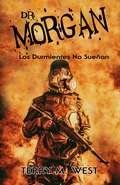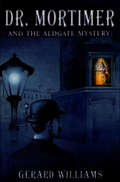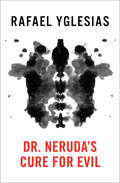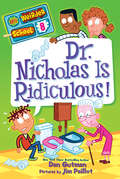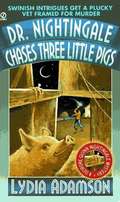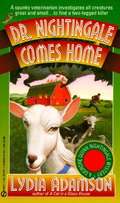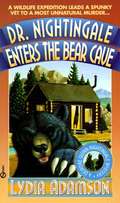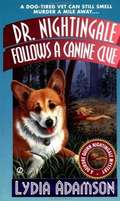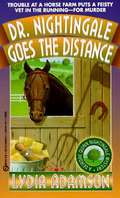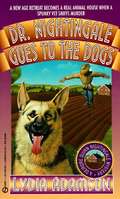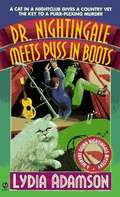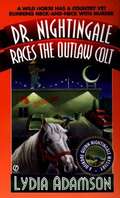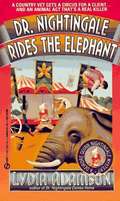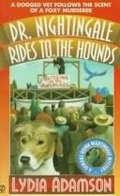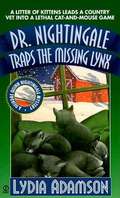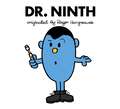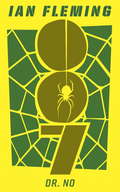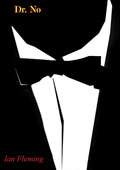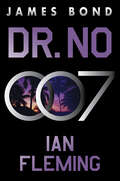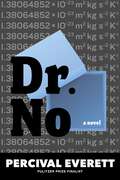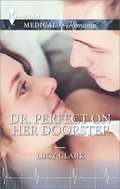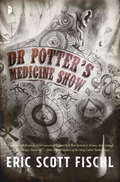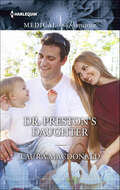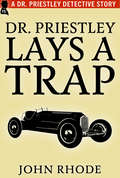- Table View
- List View
Dr. Morgan: Los durmientes no sueñan
by Terry M. WestCientos de años después del gran cataclismo, el Ministerio del 45° sobrevive en una red de búnkeres científicos. El último bastión del antiguo orden sagrado, el 45°, está empeñado en reconstruir la tierra quemada y eliminar a los enemigos de Dios. El Ministerio está en guerra contra los mutantes topsiders, quienes ocupan los estados muertos de la Unión Soviética de América. La Guardia Roja defiende al 45°, compuesta por soldados genéticamente modificados que están programados para obedecer a través de su etiqueta social. El Dr. Morgan es un militar de la Unidad 468 de la Guardia Roja. El Dr. Morgan es el médico de campo que más tiempo ha sobrevivido en servicio, y su etiqueta social es la medicina, pero el Dr. Morgan es un hombre profundamente conflictivo con fantasías violentas que contradicen su promesa de preservar la vida. Después de escapar de un secuestro por parte de los topsiders, la fe del Dr. Morgan se romperá. Durante un permiso en el búnker del Canciller, el Dr. Morgan es aclamado como un héroe y puesto al frente. Pronto se dará cuenta de que alguien ha alterado su etiqueta social y ha levantado el velo que ocultaba el mayor engaño jamás perpetrado. El Dr. Morgan se convertirá en el hombre más peligroso de las tierras baldías. Y cuando descubra quién es el verdadero enemigo, la revelación desatará una furia lo suficientemente fuerte como para destruir lo que queda de la tierra.
Dr. Mortimer and the Aldgate Mystery
by Gerard WilliamsSet amid the clip and clatter of hansom cabs and the popping of the gaslights, this intriguing mystery introduces Dr. James Mortimer, the man who brought the case of the Hound of the Baskervilles to the attention of Sherlock Holmes. Here, Dr. Mortimer tells a tale of how he came across his second and most challenging case ever.In 1890, the young Dr. Mortimer is numb with grief over the death of his wife and decides to close his own practice and begin a new life for himself. He winds up in London and is asked to fill in for another doctor with an emergency. Dr. Mortimer agrees and his last call of the day brings him to an address in Aldgate where he meets the captivating Lavinia Nancarrow. Intrigued and worried by the overbearing solicitude of the girl's guardian who keeps her a virtual prisoner, Mortimer determines to discover the reasons behind Lavinia's confinement.Engagingly absent-minded but incessantly curious and observant, Mortimer is aided in his effort by his formidable consort, the liberated Dr. Violet Branscombe. Together they unravel a mystery as dark and sinister as the East End Alleys of Victorian London. A retired Calcutta merchant with a guilty secret, a decadent fin-de-siecle artist who frequents an anarchist café in Whitechapel and a seemingly impossible murder are the key pieces in the puzzle, which Mortimer soon finds himself trying to solve, in Gerard Williams's Dr. Mortimer and the Aldgate Mystery.
Dr. Neruda's Cure for Evil
by Rafael YglesiasA suspenseful novel of ideas that explores the limitations of science, the origins of immorality, and the ultimate unknowability of the human psyche Rafael Neruda is a brilliant psychiatrist renowned for his effective treatment of former child-abuse victims. Apart from his talent as an analyst, he&’s deeply empathetic—he himself has been a victim of abuse. Gene Kenny is simply one more patient that Dr. Neruda has &“cured&” of past trauma. And then Kenny commits a terrible crime. Desperate to find out why, Dr. Neruda must shed the standards of his training, risking his own sanity in uncovering the disturbing secrets of Kenny&’s former life. Structured as actual case studies and steeped in the history of psychoanalysis, Dr. Neruda&’s Cure for Evil is Yglesias&’s most formally and intellectually ambitious novel. This ebook features a new illustrated biography of Rafael Yglesias, including rare photos and never-before-seen documents from the author&’s personal collection.
Dr. Nicholas Is Ridiculous! (My Weirder School #8)
by Dan GutmanMy Weirder School weirder than ever Dr. Nicholas is the weirdest history teacher in history She doesnt care about wars and presidents. She is going to teach the kids about the history of the toilet bowl Is she crazy? She built a time machine so she can take the kids into the past . . . and the future. Guess whos going to get stuck in time?
Dr. Nightingale Chases Three Little Pigs (A Deirdre Quinn Nightingale Mystery #6)
by Lydia Adamson[from the back cover] "Murder--in a pigs eye! A lovely little milk cow is terribly sick, and looking around the rundown dairy farm, Deirdre "Didi" Nightingale, D.V.M., isn't surprised. She is, however, shocked when her favorite vet-school professor, the elderly Hiram Bechtold, warns that she is about to be questioned in a murder. A client Dr. Bechtold had sent to Didi--the rich owner of an ultramodern pig farm--was brutally slain in his Philadelphia home. The police had found an incriminating letter at the bloody scene addressed to his lover: Didi Nightingale! Didi hardly knew the victim, and certainly never had an affair with him. She is astounded that the interrogating cop is serious about arresting her. Why is she being framed? Didi, smelling a rat--or at least a pig--in this dirty case, must move fast before she becomes dead meat. Going after the truth means reaching whole hog into secrets, greedy motives, and perhaps some swinish passions that can get an innocent vet tried--or fried--for a crime she didn't do." Animals populate all of Didi's adventures and are described with warmth and knowledge as Didi, a rural vet, goes about getting herself into and out of trouble as she investigates murders she happens to stumble upon unexpectedly at locations like a farmyard, a circus, and a gala ball. Look for the other books in the Dr. Nightingale series including #1 Dr. Nightingale Comes Home, #2 Dr. Nightingale Rides the Elephant, #3 Dr. Nightingale Goes to the Dogs, #4 Dr. Nightingale Goes the Distance, #5 Dr. Nightingale Enters the Bear Cave, #7 Dr. Nightingale Rides to the Hounds, #8 Dr. Nightingale Meets Puss in Boots, #9 Dr. Nightingale Races the Outlaw Colt, #10 Dr. Nightingale Traps the Missing Lynx and #11 Dr. Nightingale Seeks Greener Pastures Look for the Complete 21 volume Alice Nestleton Mystery series in the Bookshare collection also by Lydia Adamson. Alice is a mostly out of work actress and part time cat sitter in New York City. View the fascinating big city through her eyes as she solves mysteries never too far from at least two cats.
Dr. Nightingale Comes Home (A Deidre Quinn Nightingale Mystery #1)
by Lydia Adamsonfrom the back cover: Going to the dogs--for murder Deirdre "Didi" Quinn Nightingale needs to solve a baffling mystery to save her struggling veterinary practice in rural New York state. Bouncing her red Jeep along country roads, she is headed for the herd of beautiful, but suddenly very crazy, French Alpine dairy goats of a "new money" gentleman farmer. Diagnosing the goats' strange malady will test her investigative skills and win her a much needed wealthy client. But the goat enigma is just a warm-up for murder. Old Dick Obey, her dearest friend since she opened her office, is found dead, mutilated by wild dogs. Or so the local police force says. Didi's look at the evidence from a vet's perspective convinces her the killer species isn't canine but human. Now she's snooping among the region's forgotten farms and tiny hamlets, where a pretty sleuth had better tread carefully on a twisted trail of animal tracks, human lies, and passions gone deadly.... Read all of the Dr. Nightingale series on Bookshare including: #2 Dr. Nightingale Rides the Elephant, #3 Dr. Nightingale Goes to the Dogs, #4. Dr. Nightingale Goes the Distance, #5. Dr. Nightingale Enters the Bear Cave, #6. Dr. Nightingale Chases Three Little Pigs, #7. Dr. Nightingale Rides to the Hounds, #8 Dr. Nightingale Meets Puss in Boots, #9 Dr. Nightingale Races the Outlaw Colt, #10 Dr. Nightingale Traps the Missing Lynx, #11 Dr. Nightingale Seeks Greener Pastures and 12. Dr. Nightingale Follows a Canine Clue. Look for the Complete 21 volume Alice Nestleton Mystery series in the Bookshare collection also by Lydia Adamson. Alice is a mostly out of work actress and part time cat sitter in New York City. View the fascinating big city through her eyes as she solves mysteries where cats, in addition to her own two pets, are at least tangentially involved. The first three books are: #1. A Cat in the Manger, #2. A Cat of a Different Color and #3. A Cat in Wolf's Clothing.
Dr. Nightingale Enters the Bear Cave (A Deirdre Quinn Nightingale Mystery #5)
by Lydia AdamsonDeath Claws Veterinarian Deirdre "Didi" Nightingale is happily taking a break from her practice to join a research team tagging pregnant black bears in the northern Catskills. Awaiting her are the thrill of adventure, the fun of taking her friend Rose along--and murder. No sooner do she and Rose arrive at the base camp than they run into the bullet-riddled body of the caretaker. Although local police insist the murder has nothing to do with the scientific expedition, Deirdre feels something fishy is afoot in bear country. She soon finds the paw print of a monster-size bruin, a creature that is a Catskills legend--and a growing reason to suspect one of her group is a killer. Meanwhile, the woods are lovely, dark, and deep. And, for a vet on the trail of a murderer, most deadly."
Dr. Nightingale Follows a Canine Clue (A Deirdre Nightingale Mystery #12(
by Lydia AdamsonThe twelfth and final book in the popular and long-running series finds Dr. Nightingale investigating the murder of her free-spirited friend, Rose -- and digging deep into Rose's apparent double-life. If anyone can sniff out the killer, it's Deirdre Nightingale. When Dr. Deirdre Nightingale's free-spirited friend, Rose, up and leaves town, the vet thinks nothing of it--until a mangy dog leads her to Rose's body in a shallow grave alongside her two dead German shepherds. Horrified, Didi vows to track the scent of Rose's murderer. The track twists into a spiral, however, when she finds evidence that Rose might have been living a double life: one as the friend Didi knew and one as Sonya, a wanted arsonist. With clues pointing every which way, from a nearby cult to New York City, Didi must rely on her animal instincts to sniff out a killer.... Read all of the Dr. Nightingale series on Bookshare including: #1 Dr. Nightingale Comes Home, #2 Dr. Nightingale Rides the Elephant, #3 Dr. Nightingale Goes to the Dogs, #4. Dr. Nightingale Goes the Distance, #5. Dr. Nightingale Enters the Bear Cave, #6. Dr. Nightingale Chases Three Little Pigs, #7. Dr. Nightingale Rides to the Hounds, #8 Dr. Nightingale Meets Puss in Boots, #9 Dr. Nightingale Races the Outlaw Colt, #10 Dr. Nightingale Traps the Missing Lynx and #11 Dr. Nightingale Seeks Greener Pastures. Look for the Complete 21 volume Alice Nestleton Mystery series in the Bookshare collection also by Lydia Adamson. Alice is a mostly out of work actress and part time cat sitter in New York City. View the fascinating big city through her eyes as she solves mysteries where cats, in addition to her own two pets, are at least tangentially involved. The first three books are: #1. A Cat in the Manger, #2. A Cat of a Different Color and #3. A Cat in Wolf's Clothing.
Dr. Nightingale Goes the Distance (A Deirdre Quinn Nightingale Mystery #4)
by Lydia AdamsonOn a high horse... for murder Intending to forget about her sick cats and ailing cows for one night, Deirdre "Didi" Nightingale, D.V.M., is all dressed up for a champagne-sipping pre-race gala at a posh thoroughbred farm. She never expects death to be on the guest list. But when two shots ring out, two bodies lie in the stall of the year's most promising filly. The filly's distraught owner offers Didi a fee and a thoroughbred all her own to find the killer. Now Deirdre is off snooping into a world of bloodlines, blood money, and bloody schemes. The odds are against this spunky vet who may find that her heart's desire is at stake--and murder waiting at the finish line.... Read all of the Dr. Nightingale series on Bookshare including: #1 Dr. Nightingale Comes Home, #2 Dr. Nightingale Rides the Elephant, #3 Dr. Nightingale Goes to the Dogs, #5. Dr. Nightingale Enters the Bear Cave, #6. Dr. Nightingale Chases Three Little Pigs, #7. Dr. Nightingale Rides to the Hounds, #8 Dr. Nightingale Meets Puss in Boots, #9 Dr. Nightingale Races the Outlaw Colt, #10 Dr. Nightingale Traps the Missing Lynx and #11 Dr. Nightingale Seeks Greener Pastures and #12 Dr. Nightingale Follows A Canine Clue.. Look for the Complete 21 volume Alice Nestleton Mystery series in the Bookshare collection also by Lydia Adamson. Alice is a mostly out of work actress and part time cat sitter in New York City. View the fascinating big city through her eyes as she solves mysteries where cats, in addition to her own two pets, are at least tangentially involved. The first three books are: #1. A Cat in the Manger, #2. A Cat of a Different Color and #3. A Cat in Wolf's Clothing.
Dr. Nightingale Goes to the Dogs (A Dr. Nightingale Mystery #3)
by Lydia Adamson[from the back cover] "Sit, Heel--Murder! Veterinarian Deirdre "Didi" Quinn Nightingale has the birthday blues. It's her day, and it's been a disaster. First she's knee-deep in mud during a "bedside" visit to a stud pig. Then she's over her head in murder when she finds ninety-year-old Mary Hyndman shot to death at her rural upstate farm. The discovery leaves Deirdre bone-weary and still facing Mary's last request: to deliver a donation to Alsatian House, a Hudson River monastery famous for its German shepherds. Deirdre finds the retreat filled with happy dogs, smiling monks, and peace. This spur-of-the-moment vacation rejuvenates Deirdre's flagging strength and spirit until another murder tugs on her new leash on life. Deirdre's investigative skills tell her this death is linked to Mary's. But getting her teeth into this case may prove too tough for even a dauntless D.V.M.... when a killer with feral instincts brings her a hairsbreadth from death." The Dr. Nightingale series is top shelf reading for both mystery and animal lovers. Animals populate all of Didi's adventures and are described with warmth and knowledge as Didi, a rural vet, goes about getting herself into and out of trouble as she investigates murders she happens to stumble upon unexpectedly at locations like a farmyard, a circus, and a gala ball. Look for the other books in the Dr. Nightingale series including #1 Dr. Nightingale Comes Home, #2 Dr. Nightingale Rides the Elephant, #4. Dr. Nightingale Goes the Distance, #5. Dr. Nightingale Enters the Bear Cave, #6. Dr. Nightingale Chases Three Little Pigs, #7. Dr. Nightingale Rides to the Hounds, #8 Dr. Nightingale Meets Puss in Boots, #9 Dr. Nightingale Races the Outlaw Colt, 10 Dr. Nightingale Traps the Missing Lynx and #11 Dr. Nightingale Seeks Greener Pastures Look for the Complete 21 volume Alice Nestleton Mystery series in the Bookshare collection also by Lydia Adamson. Alice is a mostly out of work actress and part time cat sitter in New York City. View the fascinating big city through her eyes as she solves mysteries never too far from at least two cats.
Dr. Nightingale Meets Puss in Boots (A Deirdre Quinn Nightingale Mystery #8)
by Lydia AdamsonCountry vet Deirdre Nightingale knows a swine when she sees one--whether human or animal. But a trip to New York City to learn about the common cat turns deadly when she witnesses a nightclub owner being gunned down by a bicycle messenger. The NYPD is on the case, but soon Didi has gathered more clues than cat hairs, inspiring a clever scheme that will either trap the killer--or be the end of her! The Dr. Nightingale series is top shelf reading for both mystery and animal lovers. Animals populate all of Didi's adventures and are described with warmth and knowledge as Didi, a rural vet, goes about getting herself into and out of trouble as she investigates murders she happens to stumble upon unexpectedly at locations like a farmyard, a circus, and a gala ball. Look for the other books in the Dr. Nightingale series including #1 Dr. Nightingale Comes Home, #2 Dr. Nightingale Rides the Elephant, #3 Dr. Nightingale Goes to the Dogs, #4. Dr. Nightingale Goes the Distance, #5. Dr. Nightingale Enters the Bear Cave, #6. Dr. Nightingale Chases Three Little Pigs, #7. Dr. Nightingale Rides to the Hounds, #9 Dr. Nightingale Races the Outlaw Colt, #10 Dr. Nightingale Traps the Missing Lynx and #11 Dr. Nightingale Seeks Greener Pastures Look for the Complete 21 volume Alice Nestleton Mystery series in the Bookshare collection also by Lydia Adamson. Alice is a mostly out of work actress and part time cat sitter in New York City. View the fascinating big city through her eyes as she solves mysteries where cats, in addition to her own two pets, are at least tangentially involved.
Dr. Nightingale Races the Outlaw Colt (A Dr. Dierdre Quinn Nightingale Mystery #9)
by Lydia Adamson[from the back cover] "Dr. Deirdre "Didi" Nightingale is finding the dwindling dairy industry hard on her practice--and her pocketbook. Thinking that racehorses might be the winning ticket to more business, she heads to a vet conference in Atlantic City to find out. But when Didi finds a famous horse doctor mysteriously murdered, and his widow offers her a hefty sum to edit his unfinished book, Didi is pulled into a conspiracy where the stakes are high and life seems to be cheap. Now, Didi might have to choose between making a living, and just plain living...." The Dr. Nightingale series is top shelf reading for both mystery and animal lovers. Animals populate all of Didi's adventures and are described with warmth and knowledge as Didi, a rural vet, goes about getting herself into and out of trouble as she investigates murders she happens to stumble upon unexpectedly at locations like a farmyard, a circus, and a gala ball. Look for the other books in the Dr. Nightingale series including #1 Dr. Nightingale Comes Home, #2 Dr. Nightingale Rides the Elephant, #3 Dr. Nightingale Goes To The Dogs, #4 Dr. Nightingale Goes the Distance, #5 Dr. Nightingale Enters the Bear Cave, #6 Dr. Nightingale Chases Three Little Pigs, #7 Dr. Nightingale Rides to the Hounds, #8 Dr. Nightingale Meets Puss in Boots, #10 Dr. Nightingale Traps the Missing Lynx, #11 Dr. Nightingale Seeks Greener Pastures, and #12 Dr. Nightingale Follows a Canine Clue. Look for the Complete 21 volume Alice Nestleton Mystery series in the Bookshare collection also by Lydia Adamson. Alice is a mostly out of work actress and part time cat sitter in New York City. View the fascinating big city through her eyes as she solves mysteries where cats, in addition to her own two pets, are at least tangentially involved.
Dr. Nightingale Rides the Elephant (A Deirdre Quinn Nightingale Mystery #2)
by Lydia Adamson[from the back cover] "MURDER AS HIGH AS AN ELEPHANT'S EYE... Excitement is making Deirdre "Didi" Nightingale, D.V.M., feel like a child again. There'll be no sick cows today. No clinic. No rounds. She is going to the circus. But shortly after she becomes veterinarian on call for a small traveling circus, Dolly, an extremely gentle Asian elephant, goes berserk and kills a beautiful dancer before a horrified crowd. Branded a rogue, Dolly seems doomed, and in Didi's opinion it's a bum rap that shouldn't even happen to a dog. Didi is certain that someone tampered with the elephant and is determined to save the magnificent beast from being put down. Her investigation into the tragedy leads her to another corpse, an explosively angry tiger trainer, and a "little people" performer with a big clue. Now, in the exotic world of the Big Top, Didi is walking the high wire between danger and compassion... knowing that the wild things are really found in the darkness, deep in a killer's twisted mind." Read all of the Dr. Nightingale series on Bookshare including: #1 Dr. Nightingale Comes Home, #2 Dr. Nightingale Rides the Elephant, #3 Dr. Nightingale Goes to the Dogs, #4. Dr. Nightingale Goes the Distance, #5. Dr. Nightingale Enters the Bear Cave, #6. Dr. Nightingale Chases Three Little Pigs, #7. Dr. Nightingale Rides to the Hounds, #8 Dr. Nightingale Meets Puss in Boots, #9 Dr. Nightingale Races the Outlaw Colt, #10 Dr. Nightingale Traps the Missing Lynx ,#11 Dr. Nightingale Seeks Greener Pastures and #12 Dr. Nightingale Follows A Canine Clue.. Look for the Complete 21 volume Alice Nestleton Mystery series in the Bookshare collection also by Lydia Adamson. Alice is a mostly out of work actress and part time cat sitter in New York City. View the fascinating big city through her eyes as she solves mysteries where cats, in addition to her own two pets, are at least tangentially involved. The first three books are: #1. A Cat in the Manger, #2. A Cat of a Different Color and #3. A Cat in Wolf's Clothing.
Dr. Nightingale Rides to the Hounds (A Deirdre Quinn Nightingale Mystery #7)
by Lydia Adamsonfrom the back cover "Barks, Blessings and Bullets Taking her sow, horse, and sorted yard dogs to be blessed at Lubin's Field is one of the highlights of the Easter holidays for Deirdre Nightingale, DVM. Didi is looking forward to meeting many of her clients on the procession and to making new friends. But she doesn't anticipate witnessing a murder. Didi sees John Breitland, the wealthy president of the animal welfare league, get shot dead while standing on a makeshift stage. Once the organizer of the county's biggest fox hunt, Breitland had a history of making enemies. The leading suspect is the owner of a stable Breitland -shut down, but the man has an ironclad alibi. Some say the murder was destined because Lubin's Field was cursed years ago by the tragic death of a women believed to be a witch. Didi thinks the police are barking up all the wrong trees...and she decides to listen to her own dogged intuitions to follow a deadly trail of men and dogs engaged in the original blood sport--a lust for revenge." Read all of the mysteries featuring young, gentle rural vet, Dr. Nightingale on Bookshare including: #1 Dr. Nightingale Comes Home, #2 Dr. Nightingale Rides the Elephant, #3 Dr. Nightingale Goes to the Dogs, #4. Dr. Nightingale Goes the Distance, #5. Dr. Nightingale Enters the Bear Cave, #6. Dr. Nightingale Chases Three Little Pigs, #8 Dr. Nightingale Meets Puss in Boots, #9 Dr. Nightingale Races the Outlaw Colt, #10 Dr. Nightingale Traps the Missing Lynx, #11 Dr. Nightingale Seeks Greener Pastures and #12 Dr. Nightingale Follows a Canine Clue. Look for the Complete 21 volume Alice Nestleton Mystery series in the Bookshare collection also by Lydia Adamson. Alice is a mostly out of work actress and part time cat sitter in New York City. View the fascinating big city through her eyes as she solves mysteries where cats, in addition to her own two pets, are at least tangentially involved. The first three books are: #1. A Cat in the Manger, #2. A Cat of a Different Color and #3. A Cat in Wolf's Clothing.
Dr. Nightingale Seeks Greener Pastures (A Dr. Nightingale Mystery #11)
by Lydia Adamson[from the back cover] "Dr. Deirdre "Didi" Nightingale is finding the dwindling dairy industry hard on her practice--and her pocketbook. Thinking that racehorses might be the winning ticket to more business, she heads to a vet conference in Atlantic City to find out. But when Didi finds a famous horse doctor mysteriously murdered, and his widow offers her a hefty sum to edit his unfinished book, Didi is pulled into a conspiracy where the stakes are high and life seems to be cheap. Now, Didi might have to choose between making a living, and just plain living...." The Dr. Nightingale series is top shelf reading for both mystery and animal lovers. Animals populate all of Didi's adventures and are described with warmth and knowledge as Didi, a rural vet, goes about getting herself into and out of trouble as she investigates murders she happens to stumble upon unexpectedly at locations like a farmyard, a circus, and a gala ball. Look for the other books in the Dr. Nightingale series including #1 Dr. Nightingale Comes Home, #2 Dr. Nightingale Rides the Elephant, #4. Dr. Nightingale Goes the Distance, #5. Dr. Nightingale Enters the Bear Cave, #6. Dr. Nightingale Chases Three Little Pigs, #7. Dr. Nightingale Rides to the Hounds, #8 Dr. Nightingale Meets Puss in Boots, #9 Dr. Nightingale Races the Outlaw Colt, #10 Dr. Nightingale Traps the Missing Lynx and #11 Dr. Nightingale Seeks Greener Pastures Look for the Complete 21 volume Alice Nestleton Mystery series in the Bookshare collection also by Lydia Adamson. Alice is a mostly out of work actress and part time cat sitter in New York City. View the fascinating big city through her eyes as she solves mysteries where cats, in addition to her own two pets, are at least tangentially involved.
Dr. Nightingale Traps the Missing Lynx (A Deirdre Quinn Nightingale Mystery #10)
by Lydia Adamson[from the back cover] "A SNAKE ON THE LOOSE? For a rural vet, business is sparse in midwinter months. So Dr. Deirdre "Didi" Nightingale leapt at the chance to earn a fat fee by appearing at a posh local fundraiser. Six mixed-breed bobcat kittens were to be auctioned off, and all Didi had to do was give the cats a clean bill of health. But when the party's host walks in covered with bloody scratches--and promptly drops dead--Didi is mystified. She recognizes the symptoms of rattlesnake venom when she sees them. And though these kittens may have a wild streak, the poison that killed Buster Purchase didn't come from any feline. Now it's time to go hunting for a two-legged species of snake...." Read all of the Dr. Nightingale series on Bookshare including: #1 Dr. Nightingale Comes Home, #2 Dr. Nightingale Rides the Elephant, #3 Dr. Nightingale Goes to the Dogs, #4. Dr. Nightingale Goes the Distance, #5. Dr. Nightingale Enters the Bear Cave, #6. Dr. Nightingale Chases Three Little Pigs, #7. Dr. Nightingale Rides to the Hounds, #8 Dr. Nightingale Meets Puss in Boots, #9 Dr. Nightingale Races the Outlaw Colt, #11 Dr. Nightingale Seeks Greener Pastures and 12. Dr. Nightingale Follows a Canine Clue. Look for the Complete 21 volume Alice Nestleton Mystery series in the Bookshare collection also by Lydia Adamson. Alice is a mostly out of work actress and part time cat sitter in New York City. View the fascinating big city through her eyes as she solves mysteries where cats, in addition to her own two pets, are at least tangentially involved. The first three books are: #1. A Cat in the Manger, #2. A Cat of a Different Color and #3. A Cat in Wolf's Clothing.
Dr. Ninth (Doctor Who / Roger Hargreaves)
by Adam HargreavesAn all-new Doctor Who adventure featuring the Ninth Doctor, Rose, and Jack—reimagined in the style of Roger Hargreaves. With a little help from Rose and Jack, Dr. Ninth sets out to prevent an otherworldly invasion. These storybook mash-ups, written and illustrated by Adam Hargreaves, combine the iconic storytelling of Doctor Who with the whimsical humor and design made famous by his father, Roger Hargreaves. Dr. Ninth continues this series of witty and tongue-in-cheek storybooks—each featuring one of the twelve Doctors.
Dr. No
by Ian FlemingIn the novel that inspired the original Bond film, British Secret Service agent James Bond, a.k.a. 007, is sent to Jamaica to investigate the disappearance of an MI6 operative and his secretary. There he encounters the subject of their observations, the reclusive and nefarious Dr. No. James Bond is one of the most iconic characters in 20th-century literature. In addition to the 12 novels and 9 short stories written by Ian Fleming, there have been over 40 novels and short stories written about the spy by other authors, and 26 films produced, starring actors such as Sean Connery and Daniel Craig as 007.Random House Canada is proud to bring you classic works of literature in ebook form, with the highest quality production values. Find more today and rediscover books you never knew you loved.
Dr. No (Coronet Bks. #6)
by Ian FlemingIt was a naked girl, with her back to him. She was not quite naked. She wore a broad leather belt round her waist with a hunting knife in a leather sheath at her right hip. The belt made her nakedness extraordinarily erotic. She stood not more than five yards away on the tideline looking down at something in her hand. She stood in the classical relaxed pose of the nude, all the weight on the right leg and the left knee bent and turning slightly inwards, the head to one side as she examined the things in her hand.M called this case a soft option. Bond can’t quite agree. The tropical island is luxurious, the seductive Honey Rider is beautiful and willing.But they are both part of the empire of Dr. No.The doctor is a worthy adversary, with a mind as hard and cold as his solid steel hands.Dr. No’s obsession is power. His only gifts are strictly pain-shaped.‘Masterful...beautifully written.’—Raymond Chandler, The Sunday Times.‘The essence of a James Bond thriller is its speed, its knowingness...Dr. No has a full quota of every ingredient. Bond is better than ever.’—Evening Standard.‘Wildly thrilling, packed with convincing technical detail.’—C. Day Lewis, BBC World of Books.‘Pace, brilliant descriptive powers, superb imagination...sheer entertainment.’—Spectator.
Dr. No: A James Bond Novel (James Bond #6)
by Ian FlemingJAMES BOND IS PUT TO THE TEST AGAINST AN EGOTISTICAL SCIENTIST WITH NEFARIOUS AIMSDispatched by M to investigate the mysterious disappearance of MI6’s Jamaica station chief, Bond was expecting a holiday in the sun. But when he discovers a deadly centipede placed in his hotel room, the vacation is over.On this island, all suspicious activity leads inexorably to Dr. Julius No, a reclusive megalomaniac with steel pincers for hands. To find out what the good doctor is hiding, 007 must enlist the aid of local fisherman Quarrel and alluring beachcomber Honeychile Rider.Together they will combat a local legend the natives call “the Dragon,” before Bond alone must face the most punishing test of all: an obstacle course―designed by the sadistic Dr. No himself―that measures the limits of the human body’s capacity for agony.
Dr. No: A Novel
by Percival EverettWINNER OF THE 2023 PEN/JEAN STEIN BOOK AWARDA sly, madcap novel about supervillains and nothing, really, from an American novelist whose star keeps rising The protagonist of Percival Everett’s puckish new novel is a brilliant professor of mathematics who goes by Wala Kitu. (Wala, he explains, means “nothing” in Tagalog, and Kitu is Swahili for “nothing.”) He is an expert on nothing. That is to say, he is an expert, and his area of study is nothing, and he does nothing about it. This makes him the perfect partner for the aspiring villain John Sill, who wants to break into Fort Knox to steal, well, not gold bars but a shoebox containing nothing. Once he controls nothing he’ll proceed with a dastardly plan to turn a Massachusetts town into nothing. Or so he thinks.With the help of the brainy and brainwashed astrophysicist-turned-henchwoman Eigen Vector, our professor tries to foil the villain while remaining in his employ. In the process, Wala Kitu learns that Sill’s desire to become a literal Bond villain originated in some real all-American villainy related to the murder of Martin Luther King Jr. As Sill says, “Professor, think of it this way. This country has never given anything to us and it never will. We have given everything to it. I think it’s time we gave nothing back.”Dr. No is a caper with teeth, a wildly mischievous novel from one of our most inventive, provocative, and productive writers. That it is about nothing isn’t to say that it’s not about anything. In fact, it’s about villains. Bond villains. And that’s not nothing.
Dr. Perfect on Her Doorstep
by Lucy ClarkHome is where her heart is...GP Stacey Wilton is back in her beloved hometown to run her family's medical practice. As guardian to her younger siblings, Stacey has had to put her love life on hold-especially after being abandoned by her fiancé-and now she's so over men!Then she meets delectable Dr. Pierce Brolin on the doorstep of her childhood home, and suddenly all bets are off! Stacey might have had her fair share of Mr. Wrongs, but could Pierce be her Dr. Perfect?
Dr. Potter's Medicine Show
by Eric Scott FischlThe year is 1878. Dr Alexander Potter, disgraced Civil War surgeon, now snake-oil salesman, travels the Pacific Northwest with a disheartened company of strongmen, fortune-tellers, and musical whores. Under their mysterious and murderous leader they entertain the masses while hawking the Chock-a-saw Sagwa Tonic, a vital elixir touted to cure all ills both physical and spiritual. For a few unfortunate customers, however, the Sagwa offers something much, much worse.For drunken dentist Josiah McDaniel, the Sagwa has taken everything from him; in the hired company of two accidental outlaws, the bickering brothers Solomon Parker and Agamemnon Rideout, he looks to revenge himself on the Elixir’s creator: Dr. Morrison Hedwith, businessman, body-thief, and secret alchemist, a man who is running out of time.File Under: Fantasy [ The Secret Tradition | Chemical Imbalance | Hustlers Hustled | The Carnival is Over ]
Dr. Preston's Daughter
by Laura MacDonaldHer ex-lover is back — and in for a surprise!Dr. Stephen Preston has returned, and suddenly Gemma Langford's life is thrown into chaos. Three years ago her passionate affair with him was cut short when he was appointed to a post abroad. Gemma was heartbroken — but now it's clear he wants her back in his life.Her feelings for Stephen are as strong as ever. Nevertheless, Gemma can't simply pick up where they left off. Because she has a secret — an adorable two-year-old secret named Daisy….
Dr. Priestley Lays a Trap
by John RhodeDr. Priestley Lays a Trap, first published in 1933 (and also known by the title The Motor Rally Mystery), is part of the series of mysteries featuring private detective Dr. Priestley. Author John Rhode, a pen name of Cecil Street (1884-1964), was a prolific writer of mostly detective novels, publishing more than 140 books between 1924 and 1961.From the dustjacket: The death of Lessingham and his companion, Purvis, was, indeed, a tragic affair; but an automobile accident, especially one occurring in a race, rarely arouses suspicion. Sergeant Showerby, however, was a conscientious soul. His duty was to investigate thoroughly and investigate he did, with results that were suspicious enough to arouse Inspector Hanslet of Scotland Yard and, through him, the great criminologist, Dr. Priestley.At first, there is so little evidence that one cannot understand Dr. Priestley's interest in the case. Then, one by one, clues appear—not the ordinary clues which fall fortuitously in a detective's lap, but clues that are found because the Doctor, by his famous process of logical deduction, knows where to look for them. Gradually a pattern forms so diabolical in its simplicity and effectiveness that Dr. Priestley is forced to set a dramatic trap which very nearly ends the lives of both detective and criminal.For sheer ingenuity of detective story mechanics, John Rhode has few equals and none of his many stories present a neater puzzle than this one, which will perplex all but the keenest detective fan.
